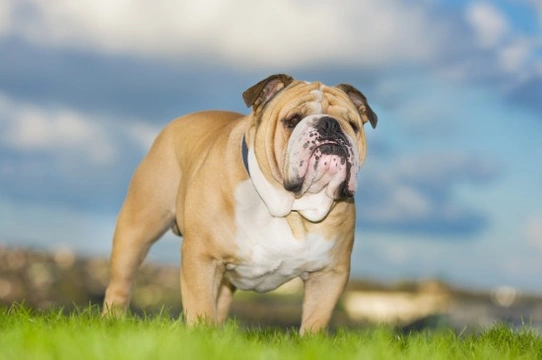Pets
Pets for studWanted petsBreedersAccessories & services
Knowledge hub
Support
Support & safety portal
Bulldog traits, care and temperament
The Bulldog, sometimes referred to in other countries as the English Bulldog or British Bulldog, is quite literally the dog most synonymous with the British Isles! It is often used as a symbol for all things British, and there is a lot of national pride relating to the Bulldog, with its stocky body and quirky, squashed-faced appearance.
While the Bulldog can fairly be called the ultimate British dog, these days you are more likely to see one on a poster or advert than walking down the street- the Bulldog is not as common a sight within the UK as they used to be, although they are by no means rare. If you are considering buying or adopting a Bulldog, it is of course important to do your research and find out as much as you can about the breed before buying, in order to make an informed choice.
In this article we will introduce you to some Bulldog basics, so read on to learn more!
Why are bulldogs so expensive?
One thing you might well pick up on if you are browsing adverts for Bulldogs for sale, is that they tend to be fairly expensive, even compared to other pedigree dog breeds of the same size.
The main reasons behind this are the same reasons behind why Bulldogs are not that common today, and you may have to join a waiting list with a breeder to buy one; Bulldog breeding is not that straightforward!
While mating to breed is no more complicated for the Bulldog than it is for any other breed, delivery and carrying to term is, however, no simple endeavour. Because the head of the Bulldog is so large compared to the body, 80% or more Bulldog deliveries have to be undertaken by caesarean section, which means that breeding Bulldogs can prove expensive, and add an element of risk.
Bulldogs also have a tendency to have small litters, generally consisting of only one or two puppies, and so the ultimate price for these sought-after dogs, once you also factor in the additional cost of specialist delivery, will be high.
The conformation of the bulldog
The Bulldog’s unique appearance is rather different to their historical looks, and over the last couple of hundred years, the Bulldog has been selectively bred for traits such as a large head, wide chest and squashed-up face.
Taken to extremes, these appearance traits can potentially lead to health problems, such as the aforementioned problems with delivery, breathing difficulties, problems keeping themselves cool, and other issues such as hip dysplasia.
In order to buy a healthy Bulldog, it is wise to choose a dog that does not have overly exaggerated traits, in the hopes of avoiding or minimising the likelihood of later health problems.
Bulldog temperament
The Bulldog can fairly be called a very lazy dog! Built for strength rather than lots of exercise, if you are looking for a dog that is perfectly happy with two short walks a day and not hours and hours of running around, the Bulldog would be a good choice. They are not particularly quick to move in any situation, although they do have strong guarding instincts, and tend to be fairly territorial around their home and garden.
Bulldogs are generally affectionate, simple dogs who enjoy attention and being petted, but they will not tolerate any undue pulling around by children, and need to be properly socialised with other dogs and people from an early age in order to ensure that they learn to play nicely with others!
It is possible to keep a Bulldog with smaller pets such as cats, again, provided that they are introduced carefully and trained to understand that the cat is boss and not dinner!
Bulldog intelligence and training
The Bulldog is not one of the canine bright sparks, and they are actually right down almost at the bottom of the list of the world’s most intelligent dog breeds. The Bulldog has a reputation for being stubborn and set in their ways, but this behaviour is much more likely to be a result of a relatively low level of intelligence and understanding than a genuine case of stubbornness!
Bulldog training can be challenging, and you are unlikely to be able to teach your Bulldog any higher-level skills or commands, and should stick to the simple basics, and teach and refresh them clearly and unambiguously. Bulldogs often need to be asked or told more than once to comply with a learned command, and they do not have a very good reputation for returning immediately when called either.
If you are looking for a dog that you can teach tricks to, go running with or enter competitions like agility with, the Bulldog would be a terrible choice of pet! However, if you are looking for a laid back dog that is not going to run you ragged, don’t expect too much of their training and find their stocky, lovable frames and affectionate natures very appealing, then the Bulldog might be the right dog for you.



